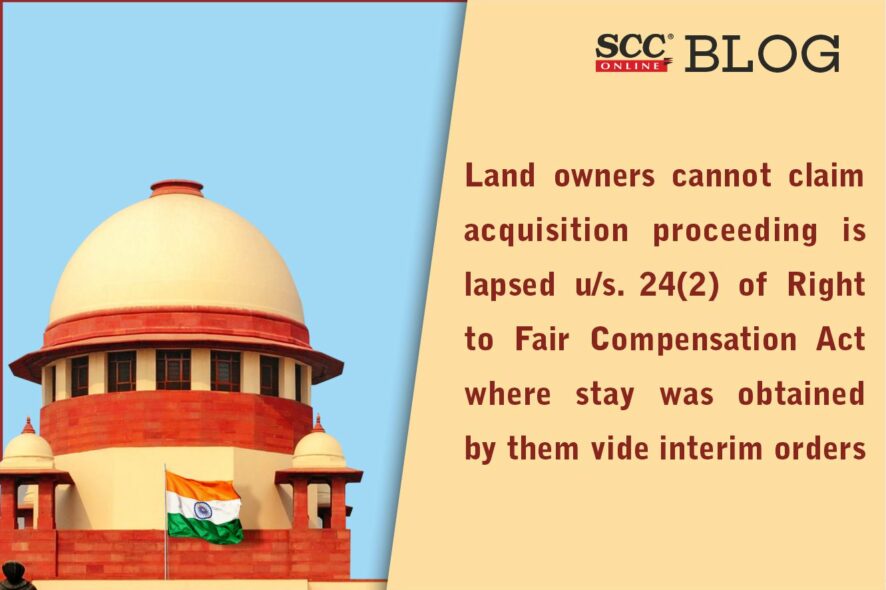Supreme Court: The Division Bench comprising of M. R. Shah* and B.V. Nagarathna, JJ., reversed the impugned judgment of Karnataka High Court holding that land owners who approach the acquisition proceedings and obtain interim orders in their favour cannot take benefit under Section 24(2) of the Right to Fair Compensation and Transparency in Land Acquisition, Rehabilitation and Resettlement Act, 2013.
The instant case arose from land acquisition proceedings, by which the State of Karnataka had issued notification to acquire disputed lands in two parts– 172 acres 22 guntas of land owned by Jamanlal Bajaj Seva Trust and 104 acres 5 guntas of land owned by very same Trust.
Decision of the High Court
The said acquisitions were challenged before the Karnataka High Court. However, when the said petitions were pending, Right to Fair Compensation and Transparency in Land Acquisition, Rehabilitation and Resettlement Act, 2013 came into force. Therefore, the petitioners submitted an application seeking to invoke the benefit of the Act, 2013 and urged that the benefit of provisions of the said Act would be available to it.
The Single Judge allowed the writ petitions by holding that respective acquisitions had lapsed under Section 24(2) of the Act, 2013, which was confirmed by the Division Bench and the appeal was dismissed. Consequently, the matter was challenged before the Supreme Court.
Mandatory for the Courts to Pronounce Judgment on all Issues
The Bench observed that although, the Single Judge framed as many as six common points for consideration, the Single Judge decided only one issue, namely, whether the acquisition proceedings have lapsed by virtue of the 2013 Act. The Bench noted that though a number of issues/grounds were raised and as such the original reliefs sought (acquisition proceedings under Act 1894) were the main reliefs which were required to be dealt with and considered, unfortunately, the Single Judge did not give findings on the other issues/grounds and on the reliefs sought and disposed of the writ petitions considering only one relief/ground.
Relying on the case of Nusli Neville Wadia v. Ivory Properties, (2020) 6 SCC 557, the Bench opined that a case may be disposed of on a preliminary issue however, it is mandatory for the Courts to pronounce judgment on all issues to avoid remand in an appealable case for deciding other issues. The Bench remarked,
“…it is the duty cast upon the courts to adjudicate on all the issues and pronounce the judgment on all the issues rather than adopting a shortcut approach and pronouncing the judgment on only one issue. By such a practice, it would increase the burden on the appellate court…”
Therefore, the Bench opined that when a number of submissions were made on the other issues/grounds, the High Court ought to have considered the other issues and ought to have given the findings on other issues also as because of omission by the High Court the Court was left with no alternative but to remand the matters to the Single Judge for deciding the Writ Petitions afresh on all other issues.
Misuse of Right to Fair Compensation and Transparency in Land Acquisition Act
The Bench noted that there has been a trend of land owners filing fresh cases seeking lapse of acquisition on the basis of Section 24(2) of the Act, 2013, although such land owners may have earlier unsuccessfully filed writ petitions challenging the acquisition notifications. The Bench opined that such land owners may have had the benefit of interim orders of stay of further proceedings in the acquisition process or dispossession resulting in a delay in the making of the award and payment/deposit of the compensation and consequently in taking over possession of the acquired land.
Consequently, there being a delay in the passing of the award owing to interim orders granted by the High Court where suits may have been filed against acquiring bodies. The Bench held that the land owners cannot now take advantage of the same so as to contend that no award has been made and consequently there has been no payment or deposit of the compensation and that possession of the acquired land continues with them. The Bench remarked,
“The land owners having had the benefit of interim orders granted in their favour in proceedings initiated by them against the acquisition cannot take benefit under Section 24(2) of the Act, 2013.”
Hence, the Bench directed that the High Court or the civil courts which may have granted interim orders in favour of the land owners, ought to consider the aforesaid aspect before applying Section 24(2) of the Act, 2013 in favour of the land owners.
Conclusion
In the backdrop of above, the impugned common judgment and order of the High Court declaring that the acquisition proceedings had lapsed under subsection (2) of Section 24 of the Act, 2013 was held to be unsustainable for being in the tooth of decision in Indore Development Authority v. Manoharlal, (2020) 8 SCC 129, and was set aside.
The matters were remitted to the Single Judge to decide and dispose of the writ petitions afresh and in accordance with law and on their own merits. Additionally, the Bench directed the Single Judge to adjudicate all other issues which were framed and pronounce the judgment on all the points framed for consideration.
[Agricultural Produce Marketing Committee v. State of Karnataka, 2022 SCC OnLine SC 342, decided on 22-03-2022]
*Judgment by: Justice M. R. Shah
Appearance by:
For the Trust: C.U. Singh, Senior Advocate
For the State: V.N. Raghupathy, Advocate
Kamini Sharma, Editorial Assistant has put this report together






